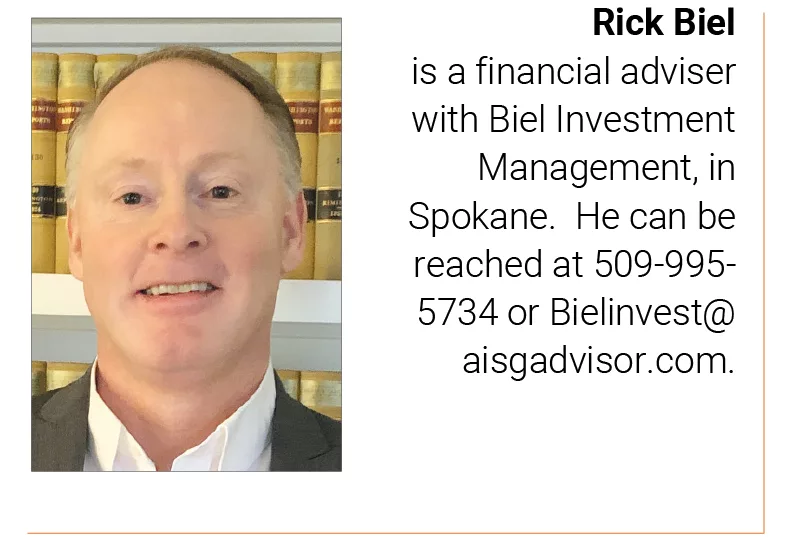Success in investing can involve more than smarts
Disciplined approach can outperform market experts

Investing is an unusual endeavor in that it is entirely possible for someone with no credentials in finance to actually outperform someone who is highly trained in that world.
You won’t find someone who is not formally trained as a brain surgeon to be able to step up and succeed in that area, obviously. However, there are numerous examples of individuals who have no formal training in finance who have been able to exceed some of the “experts” who work on Wall Street.
As someone who works in the financial advisory business, I have passed multiple industry licensing exams. While I do not consider myself to be highly intelligent at all, I have, in an attempt to better serve my clients, attained three professional financial services designations which means that I have 12 letters after my name.
With all of this studying and training, it might be safe to assume that I am extremely wealthy and I probably far exceed the accumulated assets and net worth of all of my clients. I wish that were true. The reality is that I have many clients who have no formal training whatsoever in the financial services industry who far exceed me in net worth and accumulated assets, even though I am the trained “expert.”
It would seem that the experts on Wall Street, as a result of their superior intellect and their vast knowledge within the investing world, would be able to use their education and training to have unparalleled financial success, because they have access to more information than those who don’t live in that world.
Well, there are many specific examples of individuals who have little formal education in investing who have beaten the “experts.” I would like to share of couple of examples below.
Grace Groner passed away in 2010 at the age of 100. She was orphaned at the age of 12. She went on to live a very humble and quiet life. In fact, she lived most of her life alone in a one-bedroom house and she never drove a car.
She went on to work for 43 years as a secretary at Abbott Laboratories. While working there, she bought three shares of Abbott for $180 in 1935. She never sold a share, even though the stock split many times. She also kept reinvesting the dividends.
By the time of her death, she owned more than 100,000 shares valued at about $7 million.
Her attorney, William Marlatt, said of Grace, “she could have lived in any house in Lake Forest but she chose not to…. She enjoyed other people, and every friend she had was a friend for who she was.”
Before she passed away she established a foundation for her estate with the goal of using the income to fund Lake Forest College and to benefit students.
Close to the time of Grace Groner’s death, one of the most successful executives on Wall Street was in the news. Richard Fuscone was the former vice chairman of Merrill Lynch.
He was the opposite of Grace. He received his bachelor’s degree from Dartmouth College, his MBA from the Booth School of Business at the University of Chicago, and attended Harvard Business School. He became so successful in the investment industry that he felt the need to show everyone just how successful he was.
In addition to a mansion he had purchased in Palm Beach, Florida, Fuscone also purchased an 18,471-square-foot, 11-bathroom, two-pool, two-elevator, seven-car garage New York mansion with a $66,000 a month mortgage.
Unfortunately, his heavy borrowing and illiquid investments did him in. The same year Grace Groner left a sizable fortune to charity, Fuscone stood before a bankruptcy judge and declared: “I have been devastated by the financial crisis…The only source of liquidity is whatever my wife is able to sell in terms of personal furnishings.”
These examples attempt to point out that there is no other field where these stories are even possible. In what other field does someone with no education, no relevant experience, no resources, and no connections outperform someone with the best resources and the best connections on Wall Street? There will never be a story of a Grace Groner building a faster chip than Apple’s engineers or performing heart surgery better than a Harvard-trained cardiologist, but such a story is possible in investing.
Do you really need to be smart to succeed as an investor? Well, being smart is a great advantage in many ways in any field of endeavor.
However, being smart alone does not guarantee investment or financial success. Grace Groner and Richard Fuscone point out that behavior and patience can be a better predictor of financial success than native intelligence.
Harry Markowitz won the Nobel Prize for creating modern portfolio theory, a formula that calculates the optimal asset allocation to maximize return at a given level of risk.
In one interview, when he was asked about his disappointment in his own investment returns, he said, “I should have computed the historical co-variances of the asset classes and drawn an efficient frontier. Instead, I visualized my grief if the stock market went way up and I wasn’t in it – or if it went way down and I was completely in it. My intention was to minimize my future regret…”
Investing can get this complicated, but it doesn’t have to. I wonder who was studying the historical co-variances of asset classes on an efficient frontier most diligently – Grace Groner or Richard Fuscone?
I would certainly like to eventually reach the financial status of my wealthiest clients, who, like Grace Groner, achieved substantial wealth through discipline, patience, and perseverance. The good news is that there is still hope for me – and you. Grace Groner and Richard Fuscone’s stories reveal that it is possible to obtain substantial wealth without being the smartest guy in the room.
Related Articles
Related Products

_c.webp?t=1763626051)
_web.webp?t=1764835652)

